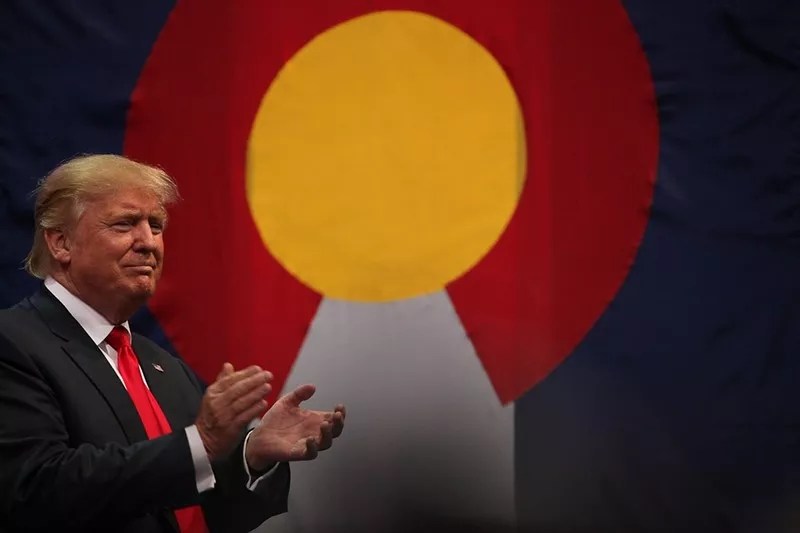
Brandon Marshall

Audio By Carbonatix
Yesterday morning, just before the inauguration ceremonies began for our once-and-future president, an email came from Donald Trump offering a litany of complaints about how he’d been treated, including this: “They REMOVED ME from the ballot in Colorado.”
Not true.
Six Coloradans – four Republicans, including onetime party mainstay Norma Anderson, who’d served as both House and Senate majority leader; two unaffiliated voters; and zero “Soros-funded Democrats,” as Trump suggested – did file suit to have Trump declared ineligible for the state’s presidential primary because of his actions on January 6, 2021. Their case went all the way to the U.S. Supreme Court…but at no time was Trump removed from the Colorado ballot.
“Why bother with the truth at this point?” sighs Krista Kafer, one of the plaintiffs in that case.
With an estimated 1,500 people who were arrested, charged and/or convicted for their actions connected to the insurrection on January 6, 2021 – including at least twenty Coloradans – now granted a “full, complete and unconditional pardon” by a Trump executive order, that’s a valid question.
But the truth matters.
“Donald Trump tried to overthrow the results of the 2020 presidential election,” charged that lawsuit, filed on behalf of the plaintiffs by Citizens for Responsibility and Ethics on September 6, 2023, in Denver District Court. “His efforts culminated on January 6, 2021, when he incited, exacerbated, and otherwise engaged in a violent insurrection at the United States Capitol by a mob who believed they were following his orders, and refused to protect the Capitol or call off the mob for nearly three hours as the attack unfolded.”
The Capitol where Donald J. Trump, the 45th president of the United States, was sworn in again on January 20, 2025, as the 47th president of the United States.
As a result, the suit argued, Trump had violated the 14th Amendment, ratified by the states and added to the U.S. Constitution in 1868, three years after the end of the Civil War and eight before the Colorado territory joined the Union. Section 3 of that amendment reads:
“No person shall be a Senator or Representative in Congress, or elector of President and Vice-President, or hold any office, civil or military, under the United States, or under any State, who, having previously taken an oath, as a member of Congress, or as an officer of the United States, or as a member of any State legislature, or as an executive or judicial officer of any State, to support the Constitution of the United States, shall have engaged in insurrection or rebellion against the same, or given aid or comfort to the enemies thereof….”
In a decision handed down in November 2023, a Denver District Court judge determined that while Trump had indeed incited an insurrection, the president did not qualify as “an officer of the United States.” Both sides appealed, and on December 19, 2023, the Colorado Supreme Court dropped a bombshell: While it concurred with the district court’s depiction of Trump’s actions on January 6, it disagreed with that judge’s interpretation of “officer of the court.” As a result, the presidency did indeed fall under Section 3, the judges ruled, and so Trump was barred from appearing on the state’s 2024 presidential primary ballot on March 5.
Pending a decision by the U.S. Supreme Court, of course, should the Colorado decision be appealed. And in the meantime, Trump’s name would be on the Colorado ballot. If the Supreme Court took the case and ruled in Colorado’s favor after those ballots were printed and mailed to registered voters, any votes for Trump would not be counted.
The U.S. Supreme Court heard arguments last February, and on the eve of the March 5 primary, it issued its decision: Trump could remain a candidate in Colorado. The determination was made on the basis of process, not Trump’s behavior: The decision of eligibility was the responsibility of Congress, the justices rules, not a “patchwork” of state decisions.
“Big win for America,’ Trump said.
He’s never been a fan of Colorado, the state he’s accused of having a “crooked” and “rigged” system since 2016. But the win in 2024, he said yesterday, was “too big to rig.”
While Trump continued firing off first-day announcements on January 20, including the executive order “Granting Pardons and Commutation of Sentences for Certain Offenses Relating to the Events at or Near the United States Capitol on January 6, 2021,” this response arrived from Noah Bookbinder, a former federal prosecutor who’s now the president of CREW, which had filed the lawsuit on behalf of those six Coloradans pushing for integrity in office.
“It is hard to overstate the destructive and devastating impact of President Trump’s sweeping pardons of January 6 participants and sentence commutations of those convicted of violent or extremely serious offenses for their role in that insurrection. The attack on the Capitol on January 6, 2021, was a violent assault on American democracy and the rule of law – an attempt to install into power by force the loser of a popular election. Giving a pass to those who participated, all of whom were convicted after trial with ample evidence and process or pleaded guilty to crimes, sends a message that the right of the people to choose our own leaders no longer matters because the results can merely be overturned by force. It also makes it clear where Trump stands on the insurrection: many of the people who attacked the Capitol said they did it because they thought they had Trump’s support. He just made it clear that they did.”
The truth matters.